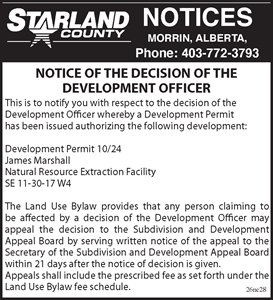
Before playing the first of a 30-show tour which will take him from Edmonton to Cape Breton in support of Valley Home, musician Joe Vickers caught up with inSide Drumheller to talk about the alternative folk album he was commissioned to create for the 2011 Mining Centennial.
Vickers, 24, grew up in Drumheller and has headed up the punk/folk band audio/rocketry, based in Edmonton where he recently completed his degree in education.
It seems you went for more of a polished, dare I say pop approach on this album compared to your previous folk albums with audio/rocketry. Was that the plan?
It’s still a roots album. It’s different compared to things I’ve done in the past with audio/rocketry. I wanted to have musical arrangements that reflected the cultural diversity of Drumheller in its early history. I wanted to make music reflective of Eastern European culture that came in, so Weekend Waltz is very reminiscent of that influence. There’s everything from bluegrass to stripped down folk songs that put an emphasis more on lyrical content, because I want the stories to be at the forefront of the songs. To be able to channel what was happening and the different attitudes and experiences depending on each story.
Were you aiming for a wider audience with this album?
Yeah, with these songs the intent was really for residents of the valley to pay respect to the heritage stories they might be familiar with. And with those unfamiliar with history, I hoped it would excite those both young and old. I didn’t try to change the sound to accommodate anybody, I think that just came naturally with trying to keep a diverse sound and trying to allow the stories to be at the forefront. You can never hide your own musical roots – they’re always going to surface.
Do you have a favourite song or story on the album?
That’s a good question, they keep changing. The first song I wrote was Into the Darkness and I was really excited when I first wrote that song because it’s recorded in A capella (no instrumental accompaniment) format and I’ve never done anything like that before. There’s no music that really hides the lyrics or anything. The story and immigrant experience of coming to the valley is not being hidden whatsoever. That was my favourite, because it set the tone for what I was looking for in creating this album. My favourite song has changed – now I like Weekend Waltz. When doing interviews with historians and miners, they were always interested in the madams and fancy gals and their influence on the valley’s narrative.
Was it hard to narrow down the stories you wanted to tell into only 13 songs?
Absolutely. Even after I recorded them I was going back to the different books to do research for write ups in the liner notes, I was coming across more stories, saying “Oh I could’ve written stories about this event or this and that,” so it was really whatever story stood out at the moment. Obviously, there was a lot I wasn’t able to cover because it’s limited to 13 tracks, but I like to think the stories I retrieved are the most significant stories of our past.
They do cover a wide range of Drumheller history.
Yeah, you have to make it as holistic as possible to give a well rounded view.
Why did you feel like this was a project you had to step up for?
The Vickers family is celebrating our centennial year in accordance to the valley, as well. Both my great-grandparents were early settlers, with N.B. Vickers opening the first hardwood store in the valley and my great-grandfather Joe Serkownak was a coal miner himself. So my family ties are strongly rooted in the history of the valley itself. I’m very much connected to past. I grew up with stories of the valley in grandparents' households, so they’re very much who I am. I felt it was a calling because it was something I could write about, because it's just close to me, really. I’m talking about something I take a lot of pride in.
Are these stories you’ve always been proud of?
Well, I think at a younger age you just recognize them as stories that were passed onto you, but as you grow older you start to appreciate things differently. While growing up in Drumheller, I was ready for something new, but it really was from afar that I realized my true point of reference was Drumheller. That’s home for me.
What would you say to youth who feel like that now?
Trying to find an appreciation at that young of an age can be difficult. Maybe that’s another angle for this album, – to allow those to get excited about our past and gain an appreciation. Why are there people living in this particular area? If you follow the trails back, you realize what our origins are and to understand why things are the way they are you have to become familiar with the origins. To say something to those kids, I don’t know if anything can be said because moving away is a wonderful thing to do.

























